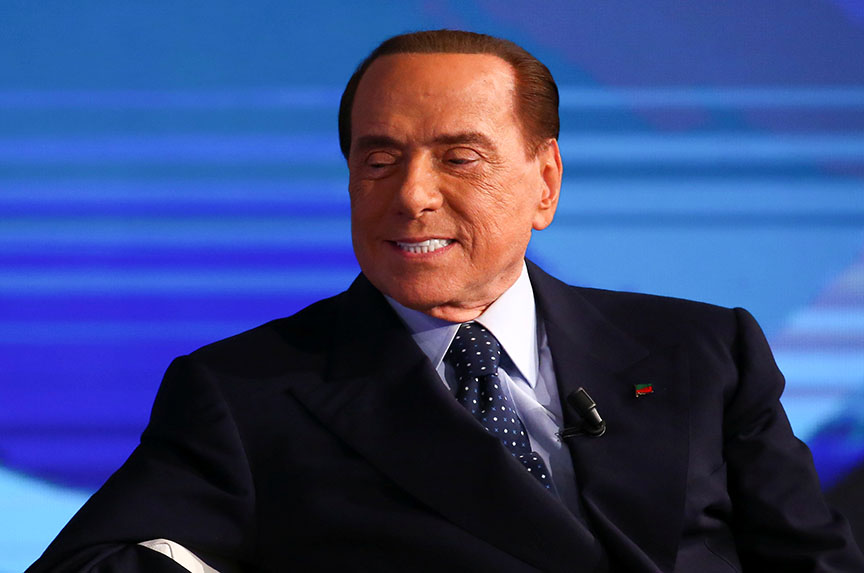 Six and a half years after he was hounded out of office, Silvio Berlusconi may be Europe’s best hope of avoiding another political crisis in Italy.
Six and a half years after he was hounded out of office, Silvio Berlusconi may be Europe’s best hope of avoiding another political crisis in Italy.
The 81-year old media tycoon is not eying a return to the premiership. A 2013 conviction for tax fraud bars him from public office. But he could end up as kingmaker after the election on March 4.
His Forza Italia (“Let’s go, Italy”) is polling at only sixteen to eighteen percent support, but no other party is close to a majority. The center-left Democrats, currently in government, are projected to win no more than a quarter of the votes. The populist Five Star Movement could place first with around twenty-seven percent support. But it has no allies.
Berlusconi has teamed up with the nativist Northern League and the post-fascist Brothers of Italy. Together they might just win a majority. If they do, Berlusconi could pick the next prime minister and exert an influence from behind the scenes. If they don’t, Berlusconi could form a German-style grand coalition with the Democrats—at a price.
Either scenario would avoid Europe’s worst fear: an anti-EU, pro-Russian pact between the Five Star Movement, Northern League, and Brothers of Italy. Although the three have (mostly) ruled out such an alliance, the rest of Europe would feel a lot better if Berlusconi could keep the other right-wing parties small enough to make it impossible.
Hence Berlusconi’s warm reception in Brussels in January, where both the president of the European Commission, Jean-Claude Juncker, and the president of the European Parliament, Antonio Tajani, endorsed Berlusconi’s leadership of the Italian right. Manfred Weber, the parliamentary group leader of the center-right and an ally of German Chancellor Angela Merkel, went so far as to call Berlusconi a “great statesman and a great European.”
That seems a little over the top.
Berlusconi is also on famously good terms with Russian President Vladimir Putin. The two even visited Crimea together after the Russian annexation. His strongman-style politics have long been an embarrassment to the European conservative family to which his party belongs. But neither of those qualities make him stand out in Italy.
The Northern League, which groups together with France’s far-right, anti-immigrant National Front in the European Parliament, is even more pro-Putin. Unlike Berlusconi, it wants to take Italy out of the euro.
The Five Star Movement says it no longer wants to take Italy out of NATO, but still calls for an immediate end to Western sanctions imposed on Russia in response to the annexation of Crimea and military intervention in eastern Ukraine.
Democratic Party leader Matteo Renzi threatened to block the renewal of EU sanctions on Russia in 2015.
The fear in Brussels is not that Italy will suddenly break with its Atlantic orientation but rather that it will again break the bloc’s deficit rules, triggering a second euro crisis.
A series of uninspiring prime ministers has managed to bring Italian public spending under control. Renzi implemented long-overdue labor reforms that made it easier for firms to hire and fire workers. The European Commission is optimistic that things are finally moving in the right direction.
But here comes Berlusconi with a promise to reverse pension cuts, introduce a “dignity income” as well as a flat tax that would altogether cost tens of billions of euros in revenue.
Italy can ill afford fiscal experiments. Its debt equals 130 percent of annual economic output, the second-highest rate in Europe, after Greece. One in three Italians under the age of 25 are out of work. Italy has the second-lowest employment rate of recent graduates in the EU, again, after Greece. Productivity is lagging. Foreign investment is slowly ticking up since reforms made it easier to start and run a business. But clearly the recovery is precarious. If Berlusconi is the best Italy can hope for, that unfortunately tells us more about the country than the man.
Nick Ottens is the owner of the transatlantic opinion website Atlantic Sentinel. Follow him on Twitter @NickOttens.
Image: Italy's former prime minister, Silvio Berlusconi, participated in the television talk show "Porta a Porta" (Door to Door) in Rome, Italy, on February 14, 2018. (Reuters/Alessandro Bianchi)

